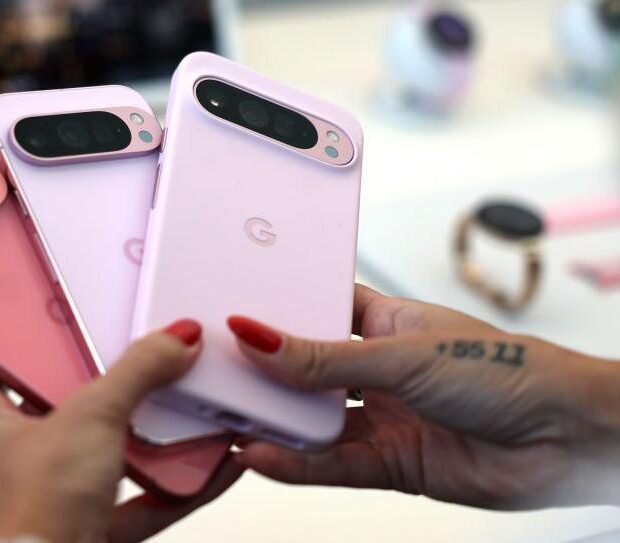London, United Kingdom — This season, the giants of technology stand tall, their new smartphones shimmering like beacons of progress. Yet, as the sleek edges of the latest iPhone 16 or Pixel 9 cut through the noise, one must pause, and ask: Do we really need another upgrade?
Every year, the technology world breathes life into new gadgets, promising to make our lives easier, faster, better. The crisp advertisements shout of AI brilliance, of cameras so precise they could capture the very soul of the moment. Tim Cook, with a steady voice, declares that the iPhone 16 will “redefine what a smartphone can do.” But in redefining it, what do we lose?
The Quieting Pulse of a World Less Driven by Upgrades
In the soft glow of store windows, where these new gadgets rest, there’s a story untold—a story of slowing sales and shifting hearts. The world, it seems, is no longer rushing to replace what isn’t broken. Once, in 2013, 30 million phones were eagerly bought each year, but now, that number has fallen to 13.5 million. People are holding onto their devices longer, perhaps cradling them as they would a familiar book, worn but comforting.
Ben Wood, a voice of clarity in this whirlwind of innovation, speaks of the human heart’s desire for what truly matters. He suggests that while AI features sparkle and shine, they aren’t at the top of everyone’s wish list. “I believe,” he says, “that what most people still crave in a phone is a good camera—one that captures not just the image but the essence of the moment.”
“Why You Shouldn’t Buy the Latest Smartphone” is a question many are asking, quietly, in the corners of their busy lives. As the cost of living rises and wallets feel the strain, we must ponder: Is the lure of a brighter screen worth the trade-offs we make? Is it worth the environmental cost, with each phone filled with precious metals that our earth can no longer afford to give?
AI May Shine, But Does It Speak to Our Souls?
Both Google and Apple have bet heavily on artificial intelligence, painting it as the future. The Pixel 9, with its Magic Editor, promises to reshape your world, erasing what you don’t want and filling the gaps with what you think you need. On the other side, Apple’s Siri is reborn, woven with the brilliance of OpenAI’s technology. But is that what we asked for?
Technology may whisper sweet promises of ease and convenience, but in the quiet moments, we realize something deeper. We realize that while AI can erase the unwanted, it may never fully understand the stories behind our imperfect moments. We ask ourselves: Can the magic of AI capture the way sunlight dances on the face of a loved one or the laughter shared in an unposed moment?
A Return to Simplicity: The Call for “Digital Sobriety”
In the backdrop of this digital deluge, a gentle but growing voice calls for “digital sobriety”—a return to what is simple, what is true. Schools in the UK are rethinking their stance on smartphones. Eton College, once a bastion of privilege and progress, has handed its students basic phones, devices stripped of distraction, encouraging them to look up from the screen and into the world around them.
There are parents, too, who join this chorus, hoping to shield their children from the relentless noise of notifications. Nova East, leading the charge of the Smartphone-Free Childhood movement, reminds us, “We’re not against technology; we’re for childhood.” It’s a poignant plea—let children be children before they are tied to a device that demands their attention.
The Simple Things We Forgot to Want
Not everyone is swept away by the promise of the future. The Nokia Barbie phone, pink and unassuming, sits like a small rebellion on store shelves. It’s a phone with no apps, no front-facing camera. Its message is clear: Not everything needs to be upgraded. Sometimes, the heart craves simplicity.
With all the new technology swirling around us, with all the features we didn’t ask for, one wonders if we’ve forgotten the beauty of a phone call that’s just a call. A moment of connection, without filters, without interruptions. Perhaps, in holding onto older phones, people are holding onto that feeling.
Balancing Between Convenience and Consciousness
As we look around, we see that smartphones are not just tools anymore. They are companions, shaping how we see the world, how we engage with those around us. But, as Pete Etchells, a thoughtful voice in the growing discourse on digital health, reminds us, “There are good things in our phones too.” They help us navigate our days, track our health, and connect with loved ones far away. Yet, in the balance of things, it’s worth asking: When does convenience overshadow consciousness?
And so, as the bright lights of the latest launches shine, there’s a quiet movement beneath. A movement not against technology, but for mindful use of it. We find ourselves at a crossroads, where we can choose to rush toward the future or pause, just for a moment, to consider what we truly need.
In the end, the choice is ours. We can follow the crowd, upgrading year after year, or we can listen to the quieter voices—those that call for a slower pace, for technology that serves us without consuming us. And in this slowing down, perhaps we’ll rediscover the things that matter most.


